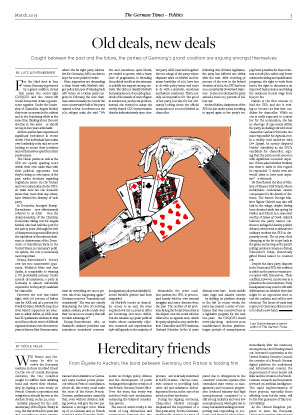Caught between the past and the future, the parties of Germany’s grand coalition are arguing amongst themselves
For the third time in four terms, Germany is governed by a grand coalition. Grand – that means the center-right CDU/CSU and the center-left Social Democrats create a government together. Under the leadership of Chancellor Angela Merkel, they must cooperate in the cabinet and in the Bundestag while at the same time thinking about the next election in two years – or should we say, in two years at the latest. All three parties have experienced significant turbulence in recent weeks. New individuals have taken over leadership roles and are now looking to secure their positions and set themselves apart from their predecessors.
The Union parties as well as the SPD are openly sparring more within their own ranks than with their political opponents. And they’re doing so over issues of the past: earlier decisions regarding migrations issues (in the Union) and over social policy (in the SPD). At stake here are the domestic issues that, more than any others, have defined the identity of each party.
In December, Annegret Kramp-Karrenbauer – now affectionately referred to as AKK – won the chairpersonship of the Christian Democrats, taking over for Angela Merkel, who had held the post for the past 19 years. Although her title of chairperson may sound like she is the equivalent of the national chairman or chairwoman of the Democratic or Republican Party in the United States, in Germany’s political system, the role is immensely more important.
Kramp-Karrenbauer’s victory over her two conservative opponents, Friedrich Merz and Jens Spahn, is comparable to winning a US presidential primary. Under normal circumstances, a party in Germany is almost universally expected to be the party’s candidate for chancellor.
However, the vote was rather tight, with 51.8 percent of ballots cast for AKK and 48.2 percent for Friedrich Merz, Merkel’s long-time rival. Merz’s supporters are reluctant to admit defeat, as AKK must face EU parliament elections in May as well as a whole series of difficult regional elections over the next two years in former East German states, where the far-right party Alternative for Germany (AfD) can dare to hope for some positive results.
Merz supporters are demanding a clean break with Merkel’s refugee policy in hopes of winning back AfD voters. At a Union party congress in February, the new chairman uttered exactly the words the more conservative half of the party wanted to hear. In reference to the 2015 refugee crisis, she said: “We must do everything we can to prevent this from happening again.” Germany must act “humanely and consistently.” She was not exactly abandoning the idea of receiving asylum-seekers, yet she made clear that “we are not a country that will be taken advantage of.”
Kramp-Karrenbauer, who as Saarland’s minister president was sometimes considered conservative and sometimes quite liberal, yet tended to govern with a heavy dose of pragmatism, is threading the political needle as she attempts to solidify her support among centrists. She did not classify Merkel’s humanitarian act of accepting hundreds of thousands of war refugees in autumn 2015 as the real problem; instead, she seemed to adopt the widely shared CDU interpretation that the indiscriminately open-door immigration policy that initially followed Merkel’s gesture had been misguided.
As Merkel’s tenure as chancellor comes to an end, the scars acquired over her 14 years in office are becoming ever-more visible. But she remains a popular political leader, whose consistently objective, measured and unpretentious style still appeals to the majority of her party. AKK must hold together the two wings of the party, whose disparate takes on Merkel and her annus horribilus of 2015 have less to do with policy issues and more to do with a symbolic, emotional and historic sentiment. This is not only an imperative for the good of her party, but also for her ultimately locking down the official nomination to succeed Merkel as chancellor.
Meanwhile, the other coalition partner, the SPD, is preoccupied mainly with its own internal struggles and some demons from the past. The mother of all problems facing the Social Democrats is the dispute over the social reforms referred to as Agenda 2010, which the party adopted in 2003 under the then-Chancellor and SPD chairman Gerhard Schröder. In the 16 years following this ill-fated legislation, the party has suffered one defeat after the next. After receiving 38 percent of the vote in the federal elections of 2002, the SPD has been on a consistently downward trajectory – in the 2017 elections the party earned a mere 20.5 percent of ballots cast.
Andrea Nahles, chairperson of the SPD for just under a year, is seeking to appeal again to her party’s traditional voter base – lower-middle class wage and salaries earners – by shifting its platform sharply to the left. In recent weeks, the party has passed a series of resolutions that was conceived less as a legislative program for the next two years – the CDU/CSU would never play along – and more as an unadulterated election platform: longer periods of unemployment pay, fewer penalties for those reluctant to seek jobs, earlier and better advanced training and qualification programs, the right to work from home, the right to disconnect, an improved basic pension and raising the minimum hourly wage from €9.19 to €12.
Nahles is the first woman to lead the SPD, and she is seeking to become its first first candidate for chancellor. While no one is really supposed to contest her for the nomination, she has no shortage of opponents within the party, including retired former chancellor Gerhard Schröder, the man responsible for Agenda 2010. In a widely read interview with Der Spiegel, he openly disputed Nahles’ suitability as the SPD’s candidate for chancellor, arguing that the party needs someone with significant economic expertise. When asked whether Nahhles has what it takes in this regard, he responded: “I doubt even she would claim to have such expertise” – a vile insult.
He then floated the idea of Minister of Finance Olaf Scholz, whose indubitable credentials cannot compensate for his dearth of charisma. The former Foreign Minister Sigmar Gabriel may also still lurk in the wings, despite having been shunted aside last spring by Nahles and Scholz in a maneuver worthy of House of Cards. Gabriel believes the party cannot continue to indulge in identity politics debates, which tend to alienate the ordinary workers the SPD so desperately needs. The 59-year-old is champing at the bit to get back in the game, and as long as the party’s polling numbers remain so dismal, Schroeder’s feisty, rhetorically gifted friend cannot be counted out.
Despite the intra-party disputes in the Union and SPD, the coalition is stable as the parties remain preoccupied with themselves. Their conflicts, however, can be seen as a prelude to the next elections. Party headquarters may even be rife with deliberations on whether there just might be an opportune time to end the coalition and call for new elections. The house of cards may topple, but German politics is sure to be dealt a new hand.
Lutz Lichtenberger
is senior editor of The German Times.



